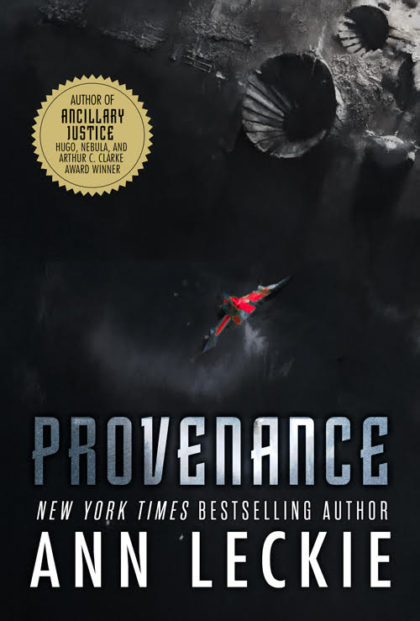 Tautological though it may be, Ann Leckie’s Provenance sure is an Ann Leckie novel.
Tautological though it may be, Ann Leckie’s Provenance sure is an Ann Leckie novel.
In just a few years and a handful of novels, Leckie has developed a rich universe as well as a particular mode of writing within it. To fans of Ancillary Justice and its sequels, Provenance will feel at once familiar and fresh, as her latest novel reaches out into nearby but still distinct areas of both the setting and the themes that she is known for.
Where the Imperial Radch trilogy was concerned with imperialism and colonialism and cultural hegemony – the exporting of one’s culture as the only “proper” way to be “civilized”, and the use of that culture as a bludgeon to force others to fall into line - Provenance is concerned with the myths and stories we tell ourselves about where our own culture came from. These stories are manifested in “vestiges” of the culture’s history, and the vestiges people collect range from historical artifacts to mere souvenirs of minor events of the past. The characters’ obsession with these vestiges, particularly those that relate somehow to the founding stories of their sovereignty, forms the framework upon which the overarching plot of Provenance is built.
And then, where the story of Breq and Awn and Anaander Mianaai was concerned with concepts of identity and the self – what it means to be a person, or to be Significant, and what happens when one is in conflict with oneself, or made to act against one’s own beliefs - Provenance examines the dynamics of family and the way that one’s upbringing influences the course of one’s life.  Provenance is full of people whose parents (or parental figures) have damaged them emotionally, turning some into sociopathic exemplars of their status-driven culture and others into distrustful misanthropes whose paranoia about their parents’ motives extends to their entire society.
Between all these thematic components, of course, Ann Leckie succeeds in once again writing an entertaining adventure story. The reader starts out a little disoriented, trying to get a handle on the setting and the cultural context surrounding the protagonists’ behavior, but as those details start to become clear the story develops into one of familial intrigue, complete with siblings jockeying for parental favor and bystanders getting sucked into their schemes. Leckie’s classically ineffable aliens make another appearance as well, always ready to show up and complicate the situation whenever things seem to be going too smoothly.
Provenance doesn’t reach quite as far into the frontiers of the science fiction genre as the Imperial Radch series did. The cultural and familial structures are a little more familiar, and the gender-identity situation isn’t as unusual. That said, the idea of gender being a decision made in the transition from adolescence to adulthood – an idea shared with JY Yang’s The Black Tides of Heaven, up for a Best Novella Hugo this year – still feels like a refreshing alternative to having gender assigned at birth, and non-binary identities are also a normal and largely unremarkable part of the setting’s culture. (Possibly part of why that feels less radical now is simply that the last three or four years have seen a lot of growth in our own culture’s ability to consider gender as far more complex than simply a description of one’s genital configuration. Maybe I’m being optimistic, or maybe it’s just that I’ve come to know multiple non-binary people in the years since I first read Ancillary Justice – but, not for the first time, it’s nice to see our society starting to catch up to the potential that our science fiction has promised us is possible.)
My Best Novel ballot so far:
- The Stone Sky, N. K. Jemisin​
- Provenance, Ann Leckie
0 comments ↓
There are no comments yet...Kick things off by filling out the form below.
You must log in to post a comment.